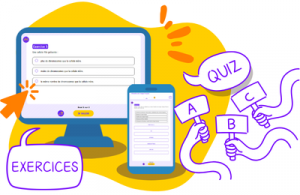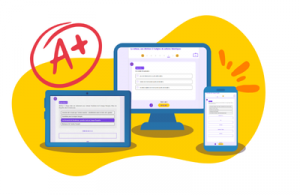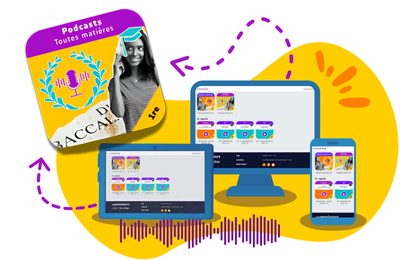Le futur avec will
- Fiche de cours
- Quiz et exercices
- Vidéos et podcasts
• sa valeur est le futur,
• il est accompagné de la base verbale (BV) d'un verbe lexical,
• il est invariable,
• il porte la négation,
• il se place devant le sujet dans les questions.
Sujet + will + BV.
| Forme affirmative | Forme affirmative contractée |
|
I will
see the boss tomorrow. You will see the boss tomorrow. He will see the boss tomorrow. She will see the boss tomorrow. We will see the boss tomorrow. You will see the boss tomorrow. They will see the boss tomorrow. |
I'll see the boss
tomorrow. You'll see the boss tomorrow. He'll see the boss tomorrow. She'll see the boss tomorrow. We'll see the boss tomorrow. You'll see the boss tomorrow. They'll see the boss tomorrow. |
Sujet + will + not + BV.
| Forme négative | Forme négative contractée |
|
I will
not
see the boss tomorrow. You will not see the boss tomorrow. He will not see the boss tomorrow. She will not see the boss tomorrow. We will not see the boss tomorrow. You will not see the boss tomorrow. They will not see the boss tomorrow. |
I won't see
the boss tomorrow. You won't see the boss tomorrow. He won't see the boss tomorrow. She won't see the boss tomorrow. We won't see the boss tomorrow. You won't see the boss tomorrow. They won't see the boss tomorrow. |
Remarque
La forme négative contractée est plus employée que la forme pleine.
Will + sujet + BV + ?
| Forme interrogative |
|
Will
I see the boss tomorrow? Will you see the boss tomorrow? Will he see the boss tomorrow? Will she see the boss tomorrow? Will we see the boss tomorrow? Will you see the boss tomorrow? Will they see the boss tomorrow? |
Remarque
Il n'y a pas de forme contractée
à la forme interrogative.
Examples
- You will take the train, won't you?
- Yes, I will.
- Vous prendrez le train, n'est-ce pas ?
- Oui.
- He won't be pleased, will he?
- No, he won't.
- Il ne sera pas content, n'est-ce pas ?
- Non.
• tomorrow (demain) ;
• next week (la semaine prochaine) ;
• next month (le mois prochain) ;
• next year (l'année prochaine)...
Example
My cousin will come and visit us next week. (Mon cousin viendra nous rendre visite la semaine prochaine.)
Example
I will be thirteen next month. (J'aurai treize ans le mois prochain.)
Will est également employé dans les horoscopes.
Example
You will marry a prince. (Vous épouserez un prince.)
Will s'utilise de même pour les prévisions météorologiques.
Example
It will be sunny tomorrow. (Il y aura du soleil demain.)
Example
This exercise is difficult. I'll help you!" (Cet exercice est difficile. Je vais t'aider !)
Example
If we have time, we will go to the cinema. (Si nous avons du temps, nous irons au cinéma.)
| Construction | |
| Forme affirmative | Sujet + will + BV |
| Forme négative |
Sujet + will + not +
BV Sujet + won't + BV |
| Forme interrogative | Will + sujet + BV + ? |
Will est un auxiliaire modal à valeur future.
Il permet une projection dans l'avenir avec un marqueur de temps.
Il s'emploie pour exprimer un événement inévitable, une prévision météo, une idée soudaine.

Des quiz et exercices pour mieux assimiler sa leçon
La plateforme de soutien scolaire en ligne myMaxicours propose des quiz et exercices en accompagnement de chaque fiche de cours. Les exercices permettent de vérifier si la leçon est bien comprise ou s’il reste encore des notions à revoir.

Des exercices variés pour ne pas s’ennuyer
Les exercices se déclinent sous toutes leurs formes sur myMaxicours ! Selon la matière et la classe étudiées, retrouvez des dictées, des mots à relier ou encore des phrases à compléter, mais aussi des textes à trous et bien d’autres formats !
Dans les classes de primaire, l’accent est mis sur des exercices illustrés très ludiques pour motiver les plus jeunes.

Des quiz pour une évaluation en direct
Les quiz et exercices permettent d’avoir un retour immédiat sur la bonne compréhension du cours. Une fois toutes les réponses communiquées, le résultat s’affiche à l’écran et permet à l’élève de se situer immédiatement.
myMaxicours offre des solutions efficaces de révision grâce aux fiches de cours et aux exercices associés. L’élève se rassure pour le prochain examen en testant ses connaissances au préalable.

Des vidéos et des podcasts pour apprendre différemment
Certains élèves ont une mémoire visuelle quand d’autres ont plutôt une mémoire auditive. myMaxicours s’adapte à tous les enfants et adolescents pour leur proposer un apprentissage serein et efficace.
Découvrez de nombreuses vidéos et podcasts en complément des fiches de cours et des exercices pour une année scolaire au top !

Des podcasts pour les révisions
La plateforme de soutien scolaire en ligne myMaxicours propose des podcasts de révision pour toutes les classes à examen : troisième, première et terminale.
Les ados peuvent écouter les différents cours afin de mieux les mémoriser en préparation de leurs examens. Des fiches de cours de différentes matières sont disponibles en podcasts ainsi qu’une préparation au grand oral avec de nombreux conseils pratiques.

Des vidéos de cours pour comprendre en image
Des vidéos de cours illustrent les notions principales à retenir et complètent les fiches de cours. De quoi réviser sa prochaine évaluation ou son prochain examen en toute confiance !










